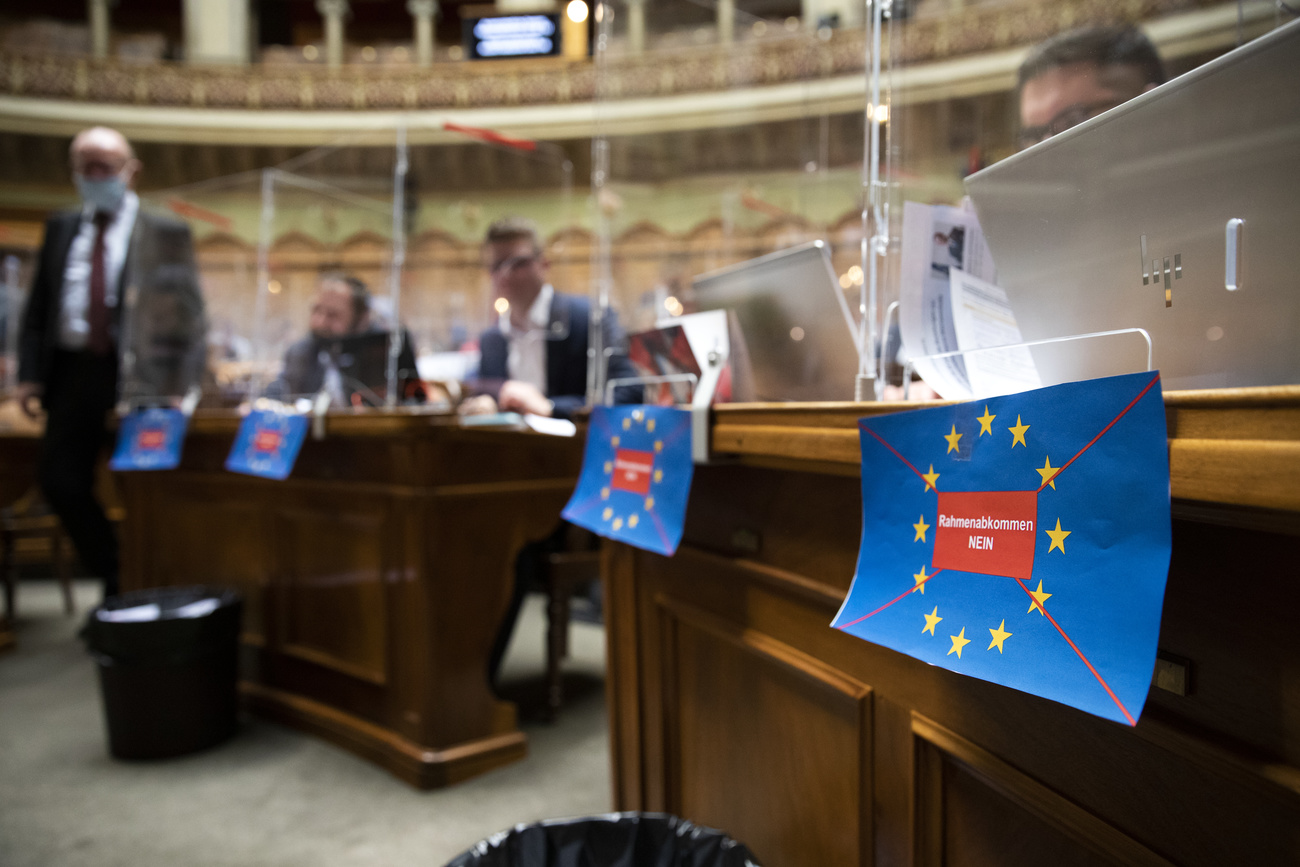The EU is not about to pull the plug on Switzerland

On the eve of the much-awaited meeting between the Swiss and European Union leaders in Brussels, the EU looks willing to make concessions on key areas to save the struggling framework deal with Switzerland.
Stop or continue? In three words, this is the question to be answered when on Friday morning, Swiss president Guy Parmelin meets his EU Commission counterpart, Ursula von der Leyen.
The long-awaited meeting comes after year-long negotiations on a draft framework agreement – meant to clarify the current web of bilateral deals between Bern and Brussels – finalised in 2018. The first talks on such a deal go back to 2005. On Friday, finally, the EU expects Parmelin to give a clear sign about whether the deal will become reality, or whether it is to be shelved in Switzerland’s museum of unfinished European projects.
Since its finalisation, the Swiss government has been hesitating on implementing the framework agreement. It launched a nationwide consultation procedure, which led to significant political and trade union opposition coming to the surface. Economic circles are divided on the deal. On Wednesday this week, just two days from the Brussels meeting, the government met once again to try to define a clear strategy.

More
Will the EU and Switzerland finally agree on a framework deal?
Brussels ready to make concessions
Europe, for its part, has done its homework, as several documents seen by SWI swissinfo.ch show. The documents also give an insight into the positions that von der Leyen will likely adopt when she meets Parmelin.
After some half-dozen meetings and video conferences in Brussels over the past months, attended by Swiss negotiator Livia Leu, the Commission reckons it has by now made proposals which cover the three areas of the deal most concerning to the Swiss government: state aid, wage protection and citizenship.
Concerning state aid regulations – which would limit public subsidies to certain branches – the Commission is willing to accept a full removal of the sticking point from the framework text. On wage protection measures for Swiss workers – a key demand of trade unions – Brussels also sees possibilities of agreement, and says it is willing to meet Swiss requests.
Finally, on the citizenship directive – which would give EU citizens in Switzerland the same right to social security as the Swiss – the Commission says it has already given adequate reassurance to Switzerland. Bern, the EU says, has responded with radio silence.
“There is no engagement by Switzerland. The Commission cannot negotiate with itself,” said a recent Commission document, written to the EU represents of the European Free Trade Association group.

More
Inching forward on Swiss-EU relations
EU law at the centre of debates
In Brussels, several sources reckon that the major obstacle to a definitive agreement lies elsewhere. According to one diplomat from an EU member state, the problem is with “the dynamic uptake of community laws and the role of the European Court of Justice”.
But these points, according to the diplomat, are “non-negotiable”.
On April 16, Stephanie Riso, the deputy director of Ursula von der Leyen’s cabinet and the counterpart of Livia Leu, gave EU ambassadors a live update on the state of bilateral relations. “We made some suggestions, but there was no concessions from the Swiss side,” was the gist of Riso’s message.
The main aim of the summit on Friday will therefore be to determine if there is still political will in Switzerland to adopt the framework agreement after the modifications are made. If so, then the meeting between the presidents could give new impetus to negotiations.
European U-turn
This flexibility – under certain conditions – marks a turning point in the European camp. Until recently, the Commission had said it was willing to clarify certain points raised by Bern, but it had refused any wholescale reopening of negotiations. “For years, the EU negotiated in good faith with people who were not easy, and who asked for so many clarifications, to the point of exhausting the whole procedure,” says another high-ranking diplomat, who spoke of the EU’s weariness with the dossier.
The temptation of dropping the whole framework remains. However, as another close source says: “it’s in the EU’s nature to look for the last path towards an agreement”. In addition, Switzerland’s neighbours, as well as poorer countries and regions who benefit from European funding (which Switzerland also contributes to), are aware there is a lot at stake. “We all stand to benefit from good relations”, the diplomat says.
France and Austria are pressuring the Commission to continue negotiating, as long as Switzerland shows a willingness to seek a solution. Germany does not want to damage future relations with Switzerland either, while Italy is pushing for discussions of a plan B in case of failure to reach a deal.
In short, the time for staking out positions is past; now the mood is one of openness and pragmatism.

More
Deal or no deal: How five non-member states handle EU relations
Ball in Parmelin’s court
In Brussels, observers see three possible scenarios for Friday’s meeting. One is that Parmelin convinces the Commission of Switzerland’s desire to find an agreement, thereby boosting efforts to continue negotiations and fine-tunings of the draft deal. Another is that the Swiss president is stonewalled; or another is that the entire situation remains just as unclear as before.
The two latter scenarios, sources say, would lead to a slow but inevitable deterioration in bilateral relations.
Translated from French by Domhnall O’Sullivan, swissinfo.ch

In compliance with the JTI standards
More: SWI swissinfo.ch certified by the Journalism Trust Initiative
You can find an overview of ongoing debates with our journalists here. Please join us!
If you want to start a conversation about a topic raised in this article or want to report factual errors, email us at english@swissinfo.ch.